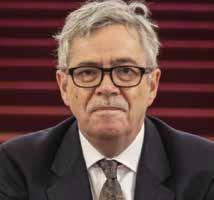
3 minute read
The View from Chancery Lane
Michael Frape Law Society Council Member for Cambridgeshire & Peterborough
New Law Society President The new President is formally appointed at the AGM. Historically the AGM has been held in July, but because of the pandemic the Council passed a resolution postponing the date of the 2020 AGM to 14th October some three months later than usual. This meant that Immediate Past President Simon Davis was in post for 15 rather than 12 months. Law Society AGM In addition to the usual business of approving the Report and Accounts and other boiler plate stuff, the AGM also considered proposals for the reform of Council. The reforms were passed, but immediately made subject to a ballot of all members (on the request of 20 members present at the AGM).
The reforms proposed: first that the number of geographical constituencies be reduced so that the number of constituencies for work areas and characteristics (such as women solicitors, junior lawyers etc.) could be increased in number; and secondly (more controversially) that Council members be subject to maximum terms of 12 years.
In the case of the “geographical” reform, my seat of “Bedfordshire and Cambridgeshire” has become “Cambridgeshire and Peterborough" and now incorporates the following
Simon Davis The new President taking over the reins from Simon is David Greene, who happens to be another litigator and may also be familiar to those who have attended our lockdown quizzes as he has attended them. David has been heavily involved in the Law Society’s (“TLS”) inner workings for many years and I am leading the profession in 2021.
sure he will do an excellent job postcodes: CB1-8; CB10-25; PE1-7; PE13-19; PE26-29.

This seems to me to be a sensible reform. I am also broadly in favour of the wider reforms generally even if there are inevitable drawbacks to them. Being a pragmatist, I recognise that there is no perfect reform and this reform moves TLS broadly in the right direction.
As to the second reform however, there are two schools of thought about the wisdom of restricting Council members to a “maximum term” of 12 years. However, as the outcome of the ballot will be known by the time you read this column, there is little point on commenting on those arguments in these pages.
Despite the controversial nature of this reform, institutional reform is generally a “good thing” and almost certainly better than no reform, and therefore (if passed) this reform may also improve Council. Law Society Transformation Programme TLS has been working for some time on transforming itself and, amongst other things, its “member offer”. The financial challenges brought by the pandemic have not left TLS unscathed as its share of practice fee income declined in 2020. Part of TLS’s response has been a restructuring of its Chancery Lane operations leading to a redundancy consultation involving 44 of circa 380 staff, although TLS is, at the same time, proposing to create 47 new roles. They are however generally understood to be more junior or temporary roles. More controversially, TLS has made all its regional representatives based in the regions (the south-west, the Midlands, and the North) redundant. This was challenged at the Council meeting in December (due to allegations of lack of consultation with relevant Council members) and was not the finest hour of TLS CEO Paul Tennant. The Wales office has been left unscathed.
Law Society Website and “MyLS” May I commend the (relatively) new Law Society website to you. You will find useful content in the site and you can shape that content for your own interests and practice area by inputting your details and preferences in the “MyLS” section. There is also an online discussion forum for members called “Law Society Connect” styled as “The meeting place for members”. It’s pretty good with relevant content, and you can create your own discussion topic.
Climate Change Working Group I am delighted to report that the Law Society has (and not before time) formed a working group to help shape the Law Society’s strategy and future approach to this important matter. Climate change is the most important challenge that humanity faces in the 21st century. If the climate challenge is not met, the coming crisis will make the Covid pandemic seem like a trivial concern.








